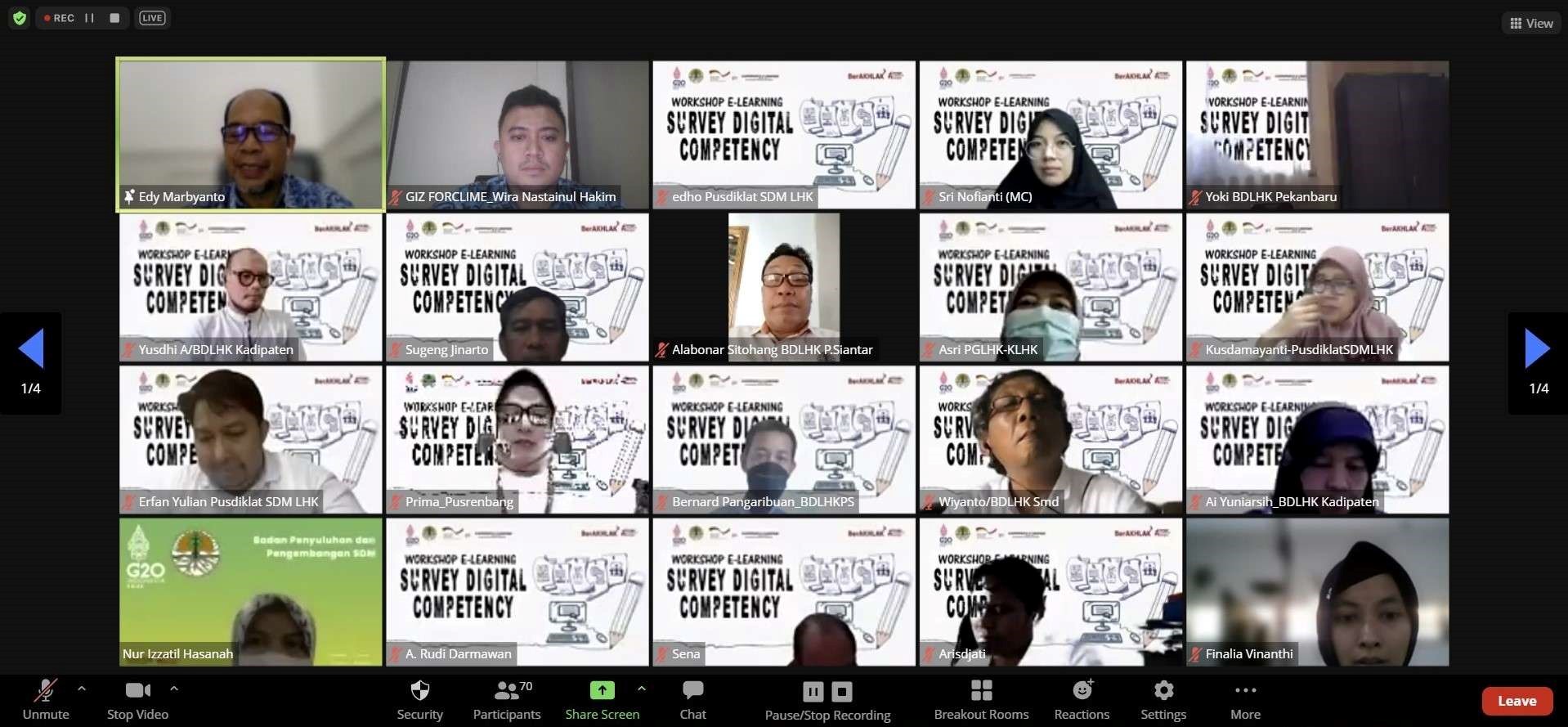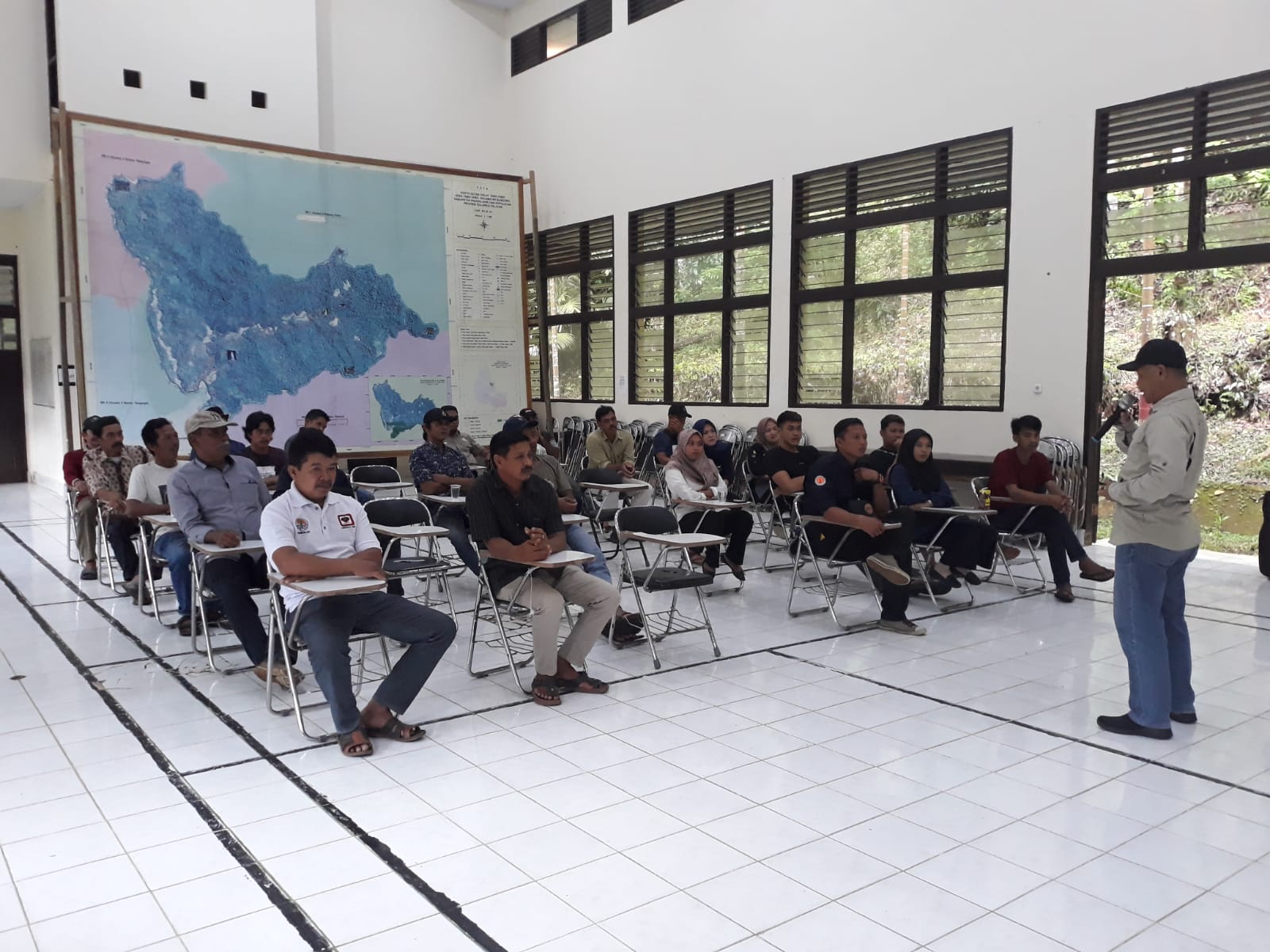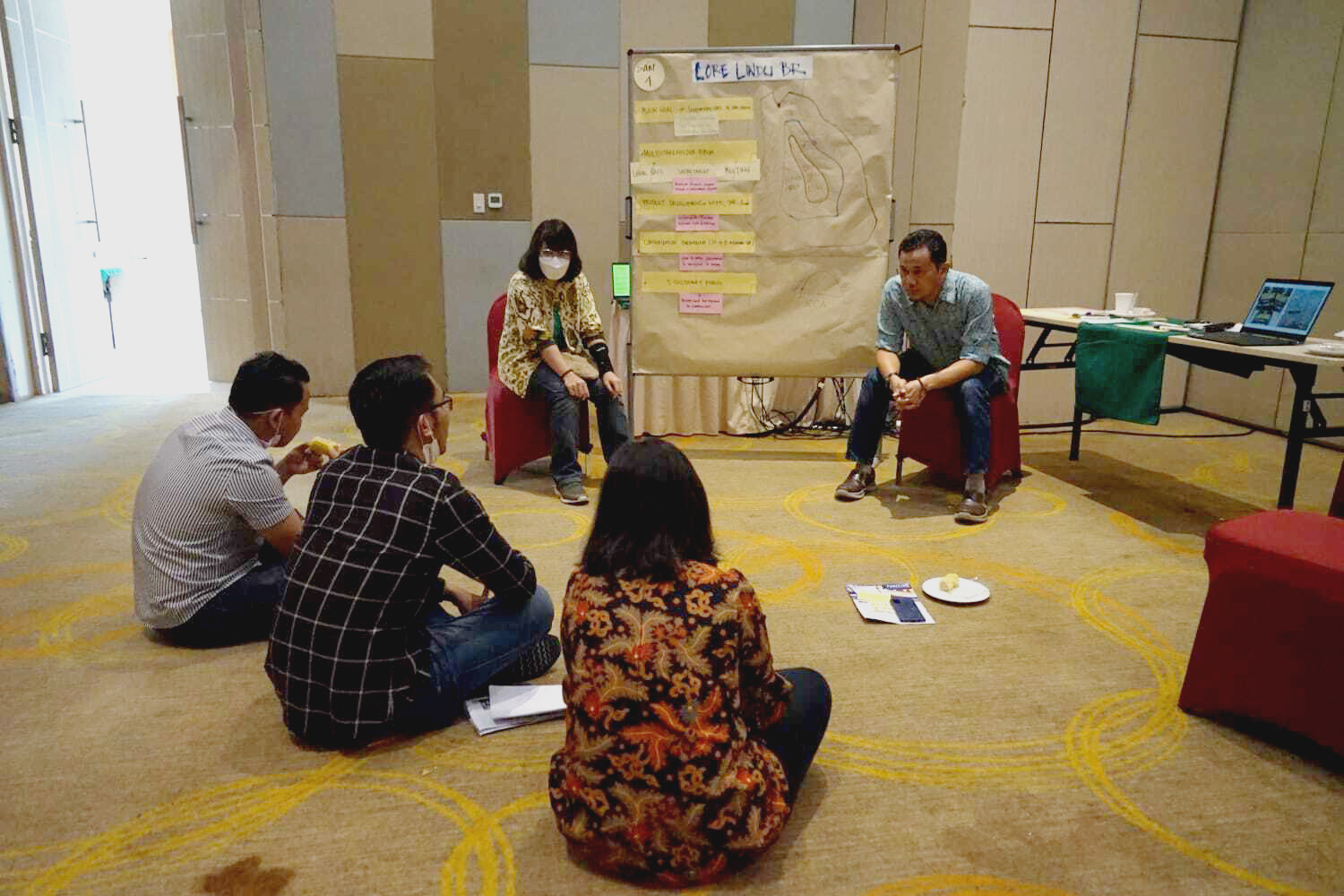FORCLIME
Forests and Climate Change ProgrammeTechnical Cooperation (TC Module)

Select your language

One type of assistance that is being provided in relation to e-learning development within the Center of Environment and Forestry Education and Training (CEFET) and the Environment and Forestry Education and Training Center (BDLHK) by FORCLIME and Common Sense are digital literacy assessments of CEFET and BDLHK employees. In this regard, a survey was undertaken in June 2022 with target respondents representing widyaiswara (trainers), structural officials, functional employees of Learning Technology Developers, Learning Management System (LMS) admins and admins of training providers. The purpose of the survey was the measurement of respondents’ digital competence as regards the implementation of their duties in relation to eLearning development. On 6 July 2022, an online workshop was held in order to present the results of this digital literacy assessment.
The meeting was opened by the Head of CEFET, Mrs. Dr. Ir. Kusdamayanti, M.Si., who stated that the eLearning development cooperation with FORCLIME and several other institutions that was initiated back in 2014 has provided many benefits, particularly in relation to the ongoing pandemic, and has meant that CEFET has been able to continue to perform its duties in relation to human resources development activities through processes of eLearning. The CEFET eLearning team, represented by Mr. Erfan Noor Yulian, then delivered a presentation that addressed the most recent updates on eLearning conditions, including the various challenges and obstacles that are being experienced.
The main session of the workshop comprised a presentation of the assessment results, which was delivered by Mr. Wahyu Supartono from Common Sense. Based on the assessment results, the Common Sense team has offered a number of recommendations in relation to the following areas:
1) List of training required by each target group.
2) Workflow for the implementation of training through eLearning
3) Tools that can be used to maximize eLearning, including authoring tools such as Articulate Rise and Adapt, as well as video tools such as Vyond.
4) Development of the Content Creation Team unit and staff regeneration in relation to several positions.
5) Hardware and software capable of supporting eLearning programmes.
In addition, LMS maintenance is also expected to be further improved through the addition of staff responsible for the Learning Management System.
For more information, please contact:
Wira Hakim, Advisor for Human Capacity Development
Edy Marbyanto, Strategic Area Manager for Human Capacity Development

The Makassar Environmental and Forestry Education and Training Agency (BD LHK Makassar) held a recent discussion in order to validate and solicit inputs for the various programmes and activities that will be implemented during the 2022 - 2024 period in relation to the empowerment of communities living close to the Tabo-Tabo Education and Training Forest. The event was held on 15 June 2022 at the Campus of the Tabo-Tabo Education and Training Forest and was attended by 30 participants who were representing four forest farmer groups who are currently inhabiting areas close to the Special Purpose Forest Area (KHDTK) of the Tabo-Tabo Education and Training Forest, as well as lecturers (Widyaiswara), BD LHK Makassar, Forest Extension Officers and FORCLIME.
During the meeting, participants discussed the various problems that are currently being faced by forest farmer groups, particularly problems relating to weak institutional structures and the fact that group business development is still less than optimal. The participants also discussed the various community empowerment programme plans and activities that will be implemented during the second semester of the 2022 - 2024 period. In general, the planned activities have been divided into three groups, specifically: (a) Strengthening the institutional management of forest farmer groups; (b) Strengthening community participation in forest conservation and area management activities; (c) Facilitating the development of community-based economic enterprises based on forestry and agriculture.
As a follow-up, information relating to the Roadmap on the Empowerment of Communities Living Around the Tabo-Tabo Education and Training Forest will be disseminated in the near future. Other stakeholders will be invited to this event, including representatives from the district government, the Tabo-Tabo Village Government, the Sulawesi Region of the Social Forestry and Environmental Partnership (PSKL) office, the Forestry Vocational School in Makassar, and various other parties. Through the involvement of these stakeholders, it is hoped that activities relating to community empowerment within Tabo-Tabo will be implemented synergistically and collaboratively.
For more information, please contact:
Edy Marbyanto, Strategic Area Manager for Human Capacity Develop

FORCLIME regularly holds Quarterly Meetings as a means of communicating and coordinating with its partners. During this second quarter of 2022, FORCLIME organized a Quarterly Meeting in Samarinda, which was held from 7 - 9 June 2022.
The first day of the Quarterly Meeting opened with a presentation that was given by Mr. Georg Buchholz, Programme Director of FORCLIME and that addressed updated policies at BMZ and GIZ as they relate to FORCLIME activities before going on to tackle the topic of the monitoring and evaluation of FORCLIME's progress and achievements within the context of the implementation of appropriate strategies heading forward.
Next, Mrs. Nur Hygiawati Rahayu, Director of Forestry and Water Resources Conservation at the Ministry of National Development Planning/Bappenas set out some possible directions in which the FORCLIME programme could head next and offered an explanation of various forestry planning issues at the national level, particularly in relation to bioeconomy. FORCLIME has pledged its support for Bappenas in terms of the conducting of a bioeconomy study, which is expected to contribute to the Background Study for the National Medium-Term Development Plan (RPJMN) 2025 - 2029.
In the afternoon, discussions focused on the issue of Forest Management Units (KPH) and social forestry in Papua and West Papua. This session was attended virtually by representatives from the Ministry of Environment and Forestry Implementing Unit for Forest Planning (BPKH) Region X Jayapura, BPKH Region XVII Manokwari, Production Forest Management Center (BPHP) Region XV Jayapura and BPHP Region XVI Manokwari. The attending representatives from BPKH and BPHP discussed the challenges and potentials in their respective work areas and also provided input to FORCLIME regarding a potential collaboration.
The second day of the Quarterly Meeting featured a knowledge and learning exchange with GIZ’s Peatland Management and Rehabilitation Project (PROPEAT), which is being implemented in Kalimantan. The world cafe method was utilised during this knowledge exchange session while six booths discussed specific issues relating to FORCLIME and PROPEAT with two persons in charge (PIC) in each booth. With the exception of the PIC, the meeting participants were required to visit all of the booths, listen to explanations of the relevant issues and exchange ideas.
The agenda for the last day of the Quarterly Meeting included a visit to one of the ecotourism areas owned by PT Inhutani I, specifically Wanawisata Bukit Bangkirai.
For more information, please contact:
Nurdita Rahmadani, Junior Advisor for Monitoring, Evaluation and Reporting
 |
Supported By: |
  |